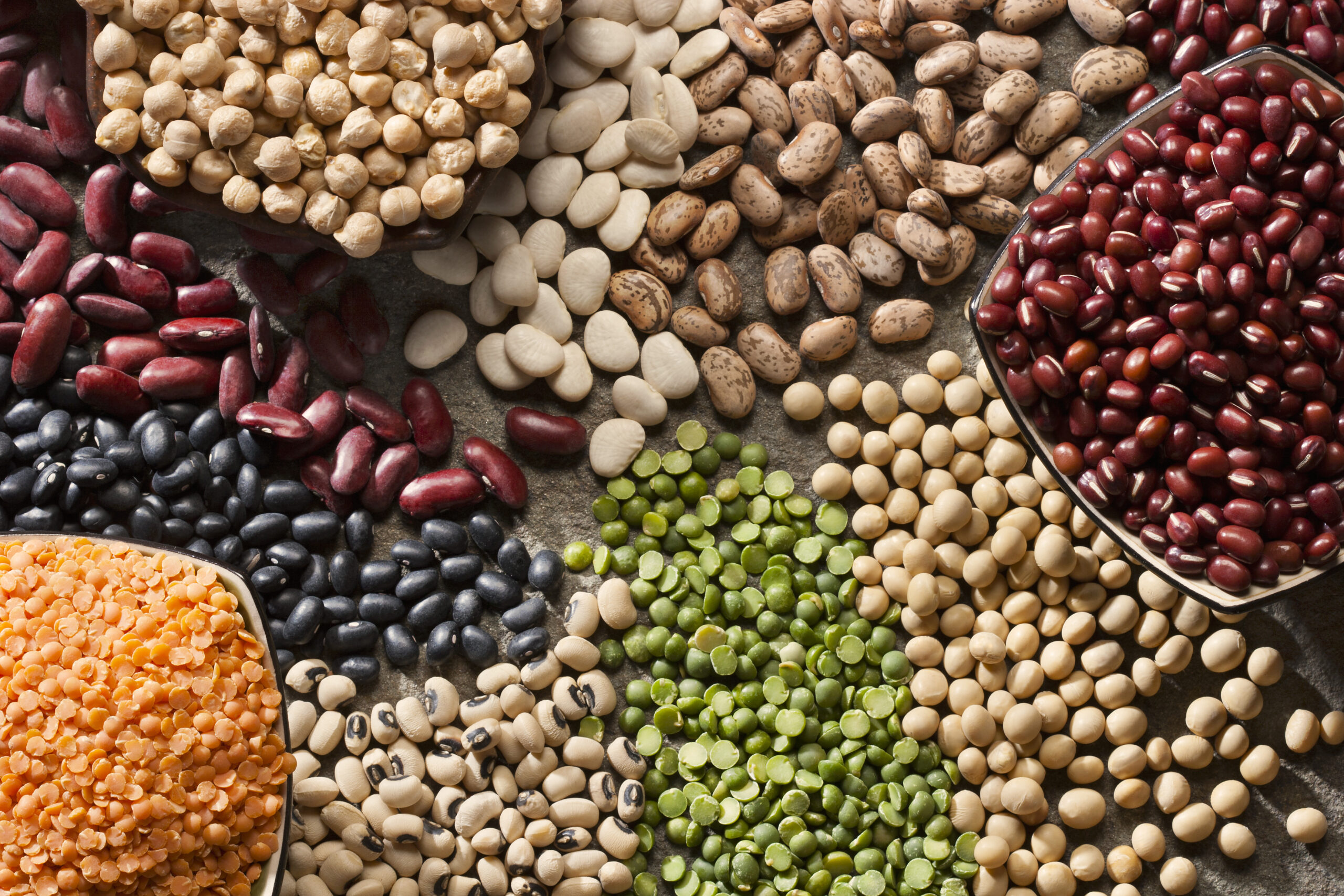Every so often, a new health buzzword will emerge. From nightshades to GMOs to nitrates, it can be confusing to suddenly hear tons of information about something you didn’t even know existed!
That’s why I’m here—to cut through the noise and misinformation that can be rampant in the health and wellness space, and tell you everything you need to know about fueling your body with the food you need to thrive.
So let’s set the record straight on lectins. It’s another one of those buzzwords you may have heard recently. But what are they? Where are they? And are you really supposed to be avoiding them at all costs? Let’s dive in.
What Are Lectins?
Lectins are a big family of proteins that bind to carbohydrates. They’re found in nearly every organism on the planet, including plants, animals, and microbes.
There is an incredibly wide variety of lectins, and we’re still learning about all the different roles they play in our ecosystem. In animals, we know they help with a wide variety of day-to-day functions. Their biggest job is helping with the immune system, working to regulate it and defend it against invaders.1
Given the diversity of plant lectins, we still have a lot more to learn about the many ways they function in different plant organisms. But researchers believe they also work in conjunction with the immune system, acting like a line of defense to fight off unfriendly pathogens.2
Some are so great at playing defense, in fact, they’re being explored as possible medicines to fight off cancer cells.3
Are Lectins Bad for You?
This is the big question. Given the complete ubiquity of lectins—they’re found in nearly every organism, after all—it’s natural to wonder if consuming them is something we should avoid.
Like many big questions, the answer is complex. There are a few different reasons some researchers have theorized that lectins and human digestive systems don’t mix.
It all comes back to the role of lectins in plants. Remember that they work as a line of defense; they’re built to prevent harmful pathogens or animals from eating them.
So some researchers suggest that when we, as animals, eat some types of lectins, our digestive systems can react poorly. Some lectins are so hellbent on defense that they resist animal digestive enzymes, meaning they pass through your body unchanged, as opposed to breaking down and converting to resources like other food we eat would.4
In nature, this works as a warning to animals not to touch that plant again, for fear of another poor reaction.
There’s another possible reason to watch out for lectins: Some are dangerous! Ricin is a highly toxic lectin found naturally in castor beans. It’s extremely rare that you’d ever be exposed to it by accident, but people have turned ricin into poison to be used as a weapon.
And you’ve heard of another far less toxic, but still potentially damaging, lectin—gluten. It’s one of the seven foods I call Hi-FI, or the most likely to cause food intolerances. When you’re sensitive to it, gluten can cause digestive upset in the short-term. In the longer term, it can lead to or exacerbate conditions like insulin resistance and a leaky gut, particularly if you have autoimmune disease.
I’m always a big fan of finding healthy swaps for gluten.
Not sure if you’re intolerant to gluten, or any of the other Hi-FI foods that cause weight gain, inflammation, digestive upset, and more? Try The Virgin Diet! In less than a month, you can responsibly find the foods that don’t agree with you, helping you finally lose and keep off weight, balance your hormones, boost your mood, and more.
How Do I Avoid Lectins?
After hearing about poisons and digestive troubles, I can certainly see why you’d try to avoid lectins.
But let’s back up a bit.
First of all, lectins are unavoidable. They’re in nearly every organism, so we’re all bound to ingest them in some form, at some point. But many of the foods commonly eaten in the U.S.—about 70%, in fact—have such a tiny amount that they don’t make an impact on your body.5
Other foods (we’ll get to which ones in a second) have much higher lectin content. But there’s good news there, too—there are very simple ways to prepare foods so that you eliminate or drastically reduce their lectins, so you can enjoy them without any disruption.
Which Foods Are High in Lectins?
In general, grains, legumes, and nightshade vegetables have the highest lectin content, though soaking them in water, boiling or roasting them, or using a pressure cooker can often bring the lectin content down to safe amounts.
But if you already deal with a leaky gut or notice some of these foods don’t make you feel the best, these are some of the ones to be the most careful about:
- Peanuts: Peanuts drive me nuts. For one, don’t listen to their name—they’re not nuts! They’re legumes, so they don’t pack the same nutrient punch as great tree nuts like almonds or macadamia nuts. They can also increase inflammation and are common allergens. Plus, the raw version is high in lectins. Roasting or boiling significantly reduces lectin content, but I’m still always going to advocate to avoid peanuts and for finding healthy swaps instead.
- Quinoa: This ancient grain can contain some wonderful health benefits, but the Incas who originated this crop prepared it much differently than we do today. They typically soaked and fermented quinoa before they ate it, removing the lectin content and making it easier to digest. You don’t have to go through the fermentation process to enjoy it, but do make sure you soak quinoa in water for several hours before boiling it (or buy sprouted quinoa to skip the process). Using a pressure cooker to cook quinoa can also help lower its lectin content.
- Red kidney beans: Let’s start off with the good stuff: red kidney beans have a lot of great health benefits, like being chock-full of both great vitamins and protein. But the raw or even undercooked versions of them are extremely high in lectins, meaning your gut is going to be worse for the wear if you try to eat them as is. Make sure you soak and properly cook these through, until they’re super soft, before you eat them.
Living With Lectins
For many people, lectins will never be an issue.
And for those who do have a leaky gut, proper food preparation can go a long way in making lectin-rich food completely digestible.
Making sense of health buzzwords isn’t always easy, but when you have the right information, you’ll be able to fuel your body with the food it needs to feel great—and enjoy every bite.
Gut issues have a way of ruining your day. Take Healthy Gut Support to help support a happy digestive system and healthy inflammatory response in the body. The curated formula of herbs and nutrients will help your body better absorb and break down food, helping you enjoy every meal—and avoid the uncomfortable aftermath. It blends easily into any drink of choice!
Sources
- Kilpatrick D. C. (2002). Animal lectins: a historical introduction and overview. Biochimica et biophysica acta, 1572(2-3), 187–197. https://doi.org/10.1016/s0304-4165(02)00308-2
- Dias, R.deO., Machado, L.dosS., Migliolo, L., & Franco, O. L. (2015). Insights into animal and plant lectins with antimicrobial activities. Molecules (Basel, Switzerland), 20(1), 519–541. https://doi.org/10.3390/molecules20010519
- Yau, T., Dan, X., Ng, C. C., & Ng, T. B. (2015). Lectins with potential for anti-cancer therapy. Molecules (Basel, Switzerland), 20(3), 3791–3810. https://doi.org/10.3390/molecules2003379
- Vojdani A. (2015). Lectins, agglutinins, and their roles in autoimmune reactivities. Alternative therapies in health and medicine, 21 Suppl 1, 46–51.
- Nachbar, M. S., & Oppenheim, J. D. (1980). Lectins in the United States diet: a survey of lectins in commonly consumed foods and a review of the literature. The American journal of clinical nutrition, 33(11), 2338–2345. https://doi.org/10.1093/ajcn/33.11.2338






